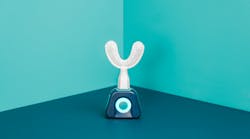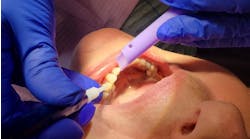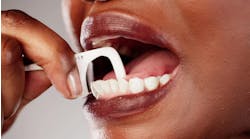All dental professionals have had patients who say they don’t have time to brush their teeth for the recommended time. In fact, most people average about 45 seconds each time they brush—less than half the recommend two minutes. But a brush hitting the US market that claims to get the job done in a fraction of that time—just 10 seconds—has the potential to quiet at least some of those claims.
The Y-Brush is a retainer-shaped toothbrush that’s been in use in Europe for a few years. Available now in the US through Amazon, the brush features “sonic vibration technology” and 35,000 nylon bristles, rather than silicone strips, that clean all of the teeth at once, according to the company’s website. (By comparison, the average manual toothbrush has about 2,500 bristles.)
Rather than moving the brush around the mouth for the typically recommended two minutes, users put one side of their mouth inside the Y-Brush and then gently chew on the brush head while rotating it around the teeth. Once done with one set of teeth, users repeat the process on the other half. At most, the process takes 30 seconds.
The British Dental Journal suggests that the Y-Brush promotes a better cleaning performance even over brushing teeth for the recommended time: “As teeth should be brushed for two to three minutes, twice a day, this corresponds to a minimum of four seconds spent on one tooth. The Y-Brush device brushes all of the top teeth simultaneously for five seconds, and then the bottom teeth for five seconds.”
What’s more, “Unlike silicone strips and other materials, nylon bristles are fine enough to reach in between the teeth, producing a deep clean and careful elimination of dental plaque.”
But dental pros shouldn’t discard their “brush for two minutes” advice quite yet, regardless of the Y-Brush’s convenience—at $80 for the more basic model, it will probably prove a bit pricey for those used to paying far less for manual toothbrushes. However, it stands to compete with electric toothbrushes, some of which cost considerably more than the Y-Brush.






